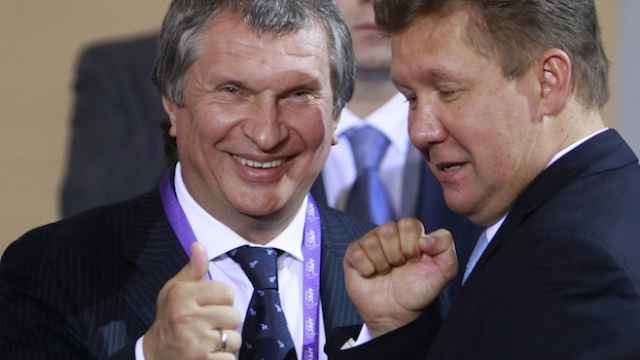Concerns are rising among U.S. businesses in Russia that Washington lawmakers could move to enshrine sanctions on Russia in new legislation, extending their impact and delaying their repeal.
The U.S. Senate Foreign Relations Committee unanimously passed such a legislative proposal last month, and analysts warn that the measure is more likely to become law if the Republican Party wins a Senate majority at midterm elections held on Tuesday or the situation in Ukraine deteriorates.
“It's getting more likely,” Stephen McHale, a partner at Washington law firm Squire Patton Boggs, said during a conference on sanctions organized by The Moscow Times this week.
Lawyers, business leaders and U.S. executives compare such a measure to the Jackson-Vanik amendment, a set of trade barriers imposed by the U.S. on the Soviet Union in 1974 for Moscow's restrictions on Jews wishing to emigrate to Israel. It was only repealed in 2012, two decades after communism's fall swept away the Soviet curbs.
“A law like this [on sanctions] is inflexible and sticky,” said Alexis Rodzianko, the president of the American Chamber of Commerce. “It would be like Jackson-Vanik.”
Decades-Long Sanctions
The three rounds of U.S. sanctions imposed on Moscow this year for its annexation of the southern Ukrainian region of Crimea and support for pro-Russian rebels fighting the Kiev government were enacted by executive order of U.S. President Barack Obama, making them relatively easy to reverse.
If sanctions are passed by U.S. lawmakers, however, their repeal would require another law — something for which it would be much harder to garner the required political will.
“When Jackson-Vanik passed it seemed like a principled assertion of support for a people who were enduring inexcusable repression,” said Bernie Sucher, a long-term U.S. investor in Russia and member of the board at Moscow brokerage Aton who splits his time between the U.S. and Russia.
“That it took the U.S. nearly a quarter century to repeal Jackson-Vanik, when the need for it had definitively passed, both hampered the bilateral relationship and distorted the act's legacy.”
Comparisons have also been drawn between putting Russia sanctions on the law books and the long-running U.S. trade embargo on Cuba, which has been in place since 1960.
Playing Politics
U.S. and European Union sanctions implemented this year have already succeeded in shutting out Russian companies from international capital markets, freezing the assets of top Kremlin officials and reducing technology transfer in the energy industry.
The indefinite extension of sanctions would amplify their effect on the Russian economy, hit efforts to maintain oil production and further isolate the Kremlin from the international community.
The Ukraine Freedom Support Act, passed by the Senate Foreign Relations Committee on Sept. 18, imposes sectoral sanctions on Russia's defense, energy and financial sectors as well as mandating an increase in military assistance for Ukraine. It was jointly sponsored by Democrat Senator Robert Menendez and Republican Bob Corker.
An earlier, even more draconian, bill, the Russian Aggression Prevention Act, was introduced in April with the backing of 20 Republicans including Corker and John McCain, an outspoken and longstanding critic of Russian President Vladimir Putin. It has not passed the committee stage.
“It's no mistake that this is happening around the mid-term elections and no mistake that it's sponsored by the Republicans,” said Kyle Davis, a partner in Moscow for law firm Goltsblat BLP who is also a qualified U.S. lawyer.
“This is much more about internal U.S. politics than about Russia.”
The fate of such legislation will, in large part, depend on events in Ukraine, where a fledgling government is grappling with an insurrection in the east. Any escalation of the tense situation, or overt Russian intervention, could build pressure on Obama to respond, allowing his opponents to use the sanctions legislation as a weapon against him.
“This legislation was thought up by people positioning themselves as tough-on-Putin guys,” Davis said. “Referring to Russia as a threat is their way of appealing to elderly voters nostalgic for the familiar geopolitical villain of their youth.”
Looking Likelier
Opinion polls suggest Republicans have a strong chance of gaining control of the Senate on Nov. 4 elections, a result that would likely see Corker, a key player in the proposed Russian sanctions legislation, elevated to chairman of the legislative body's Foreign Relations Committee.
The bill would however face strong opposition from U.S. businesses, particularly the energy and finance industries. U.S. oil major Exxon, which has been forced to halt joint projects with Russian state-owned oil giant Rosneft as a result of sanctions, spent over $6 million this year lobbying the U.S. government over issues including Russian sanctions, according to a Reuters report last month.
And even if the legislation is passed by Congress, it will require Obama's signature to become law. While Obama has the right to exercise a veto, there is little sense that he is prepared to take such a step.
In December 2012, Obama signed the repeal of Jackson-Vanik at the same time as he enacted the Magnitsky Act, a piece of legislation imposing unilateral travel bans and asset freezes on a group of Russian officials deemed responsible for the death of Sergei Magnitsky, a Russian lawyer working for a U.S. law firm who died in prison in 2009.
Obama is unlikely to pick a fight with Congress over the issue of Russian sanctions, said Sarah Vilms, a public policy adviser for Squire Patton Boggs in Washington.
“What we are hearing from our contacts in Washington is that the president will not veto this legislation,” she said.
Contact the author at h.amos@imedia.ru
A Message from The Moscow Times:
Dear readers,
We are facing unprecedented challenges. Russia's Prosecutor General's Office has designated The Moscow Times as an "undesirable" organization, criminalizing our work and putting our staff at risk of prosecution. This follows our earlier unjust labeling as a "foreign agent."
These actions are direct attempts to silence independent journalism in Russia. The authorities claim our work "discredits the decisions of the Russian leadership." We see things differently: we strive to provide accurate, unbiased reporting on Russia.
We, the journalists of The Moscow Times, refuse to be silenced. But to continue our work, we need your help.
Your support, no matter how small, makes a world of difference. If you can, please support us monthly starting from just $2. It's quick to set up, and every contribution makes a significant impact.
By supporting The Moscow Times, you're defending open, independent journalism in the face of repression. Thank you for standing with us.
Remind me later.







